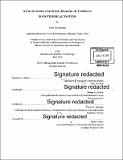A framework for sense-making of complex sociotechnical systems
Author(s)
Reymondet, Lucie
DownloadFull printable version (15.50Mb)
Other Contributors
Massachusetts Institute of Technology. Department of Aeronautics and Astronautics.
Advisor
Donna H. Rhodes.
Terms of use
Metadata
Show full item recordAbstract
Contemporary engineering systems are often highly complex, large-scale, open sociotechnical systems, with strongly interwoven technical systems and social players within a dynamic environmental context that influences both social and technical spheres. Examples of such systems include online social networks, air and maritime traffic control systems, urban transportation systems, net-centric warfare systems and humanitarian disaster relief supply chains. Growing complexity in sociotechnical systems is often blamed for unanticipated (emergent) behaviors in the system or its development, such as accidents, cascading failures, operational bottlenecks, development cost overruns and delays. A literature review highlighted the types of complexity usually tackled by systems architecting researchers and practitioners. The scope of this thesis is sociotechnical systems, and it is apparent from literature and from the examination of three example systems that types of complexity are diverse among complex sociotechnical systems. A taxonomy is proposed that compiles major threads of this review. Essentially, complexity and emergence increase the difficulty of sense making, which can be briefly defined as the ability to foresee system-level impacts of architectural decisions. Complex sociotechnical systems present challenges for systems architects: they are difficult to understand, study, predict, control or change, and often display emergent behavior, which may or may not be desirable. This thesis goes a step beyond classifying complexity to propose a framework for guiding sense-making of complexity in sociotechnical systems architecting. The systems community has developed and instantiated many modeling approaches, practices, formal languages and toolsets, to help system architects and engineers with sense-making and decision-making. This work proposes a phenomena-based framework to leverage established modeling practices and guide the selection and composition of model-centric approaches for complex sociotechnical systems architecting. The framework is applied to the Collaborative Decision Making System at Paris Charles De Gaulle airport.
Description
Thesis: S.M., Massachusetts Institute of Technology, Department of Aeronautics and Astronautics, 2016. Cataloged from PDF version of thesis. Includes bibliographical references (pages 126-133).
Date issued
2016Department
Massachusetts Institute of Technology. Department of Aeronautics and AstronauticsPublisher
Massachusetts Institute of Technology
Keywords
Aeronautics and Astronautics.